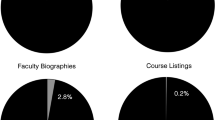Abstract
In contrast to the malaise that Collins (1986), characterized for sociology of the 1980s, I argue that the future for sociology and sociologists is bright. There are three structural changes that lead to my optimism. First, the professoriate is changing from one that has been overwhelmingly white, male, and tenured, to one that will become younger and more diverse by gender and race. Second, the fiscal crisis of the state will limit monies for funded research, which will lead to more critical and more qualitative research. Third, societal and global changes will present sociologists with unprecedented opportunities. Globally, three momentous historical turning points present sociologists with incredible opportunities: (a) the shift to a post cold war era; (b) the ecological crises threatening the worlds’s ecosystem; and (c) the transformation of the economy. Within the United States, there are many contemporary trends with considerable sociological relevance: the aging of the baby boom; the increasing proportion of the elderly; the growing racial/ethnic diversity; the regional shifts as the frost belt loses population, resources, and power, while the sun belt gains; and the growing urban underclass that is being left further and further behind. In short, the next two decades or so will present sociologists with exciting opportunities and challenges.
Similar content being viewed by others
References
Collins, Randall. 1986. “Is 1980s Sociology in the Doldrums?”American Journal of Sociology 91 (May): 1336–1355.
Eitzen, D. Stanley, and Maxine Baca Zinn. 1989. “The Forces Reshaping America.” Pp. 1–13 inThe Reshaping of America: Social Consequences of the Changing Economy, eds., D. Stanley Eitzen and Maxine Baca Zinn. Englewood Cliffs, NJ: Prentice-Hall.
Harries, Owen, Ian Buruma, and Richard Barnet. 1991. “Defining the New World Order,”Harper’s Magazine 282 (May): 59–64.
Timmer, Doug A. 1988. “Doing Sociological Autobiography.” Keynote address to the Iowa Sociological Association, Dubuque, Iowa (8 April).
Toffler, Alvin. 1990.Powershift: Knowledge, Wealth, and Violence at the Edge of the 21st Century. New York: Bantam Books.
Turner, Stephen Park, and Jonathan H. Turner. 1990.The Impossible Science: An Institutional Analysis of American Sociology. Newbury Park, CA: Sage.
Author information
Authors and Affiliations
Rights and permissions
About this article
Cite this article
Eitzen, D.S. The prospects for sociology into the twenty-first century. Am Soc 22, 109–115 (1991). https://doi.org/10.1007/BF02691871
Issue Date:
DOI: https://doi.org/10.1007/BF02691871




